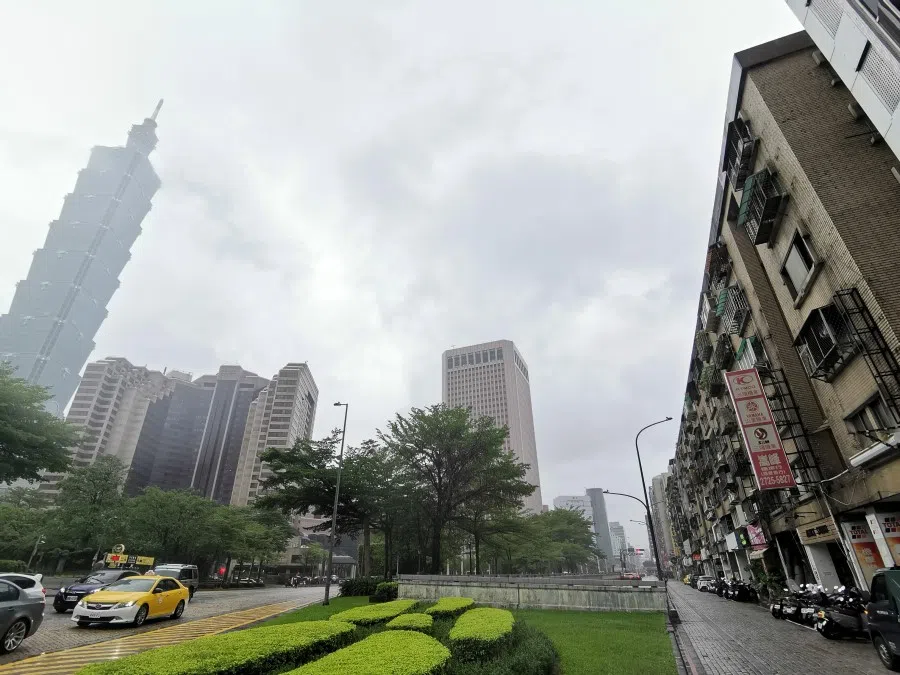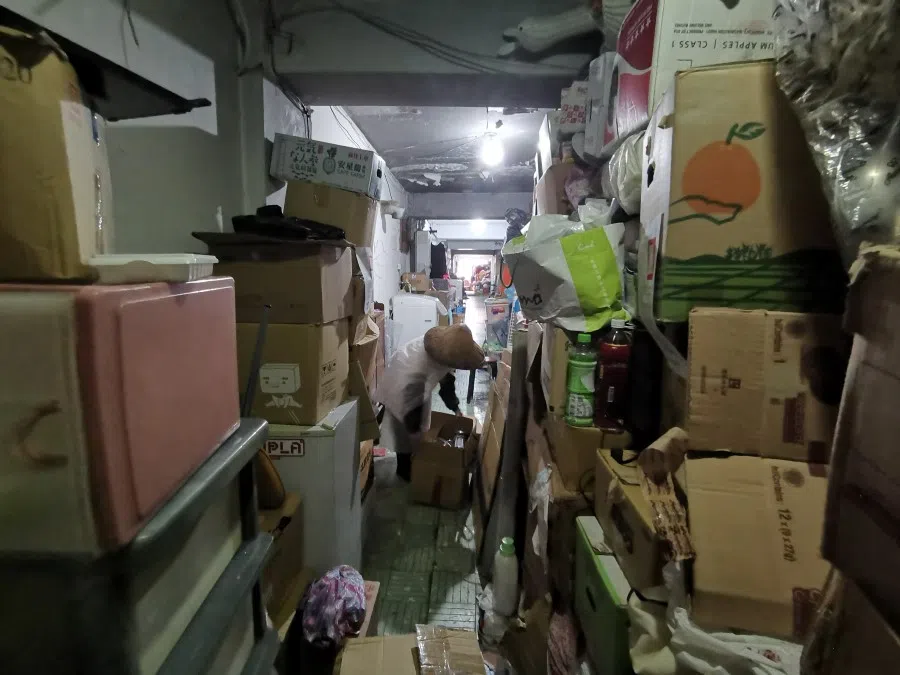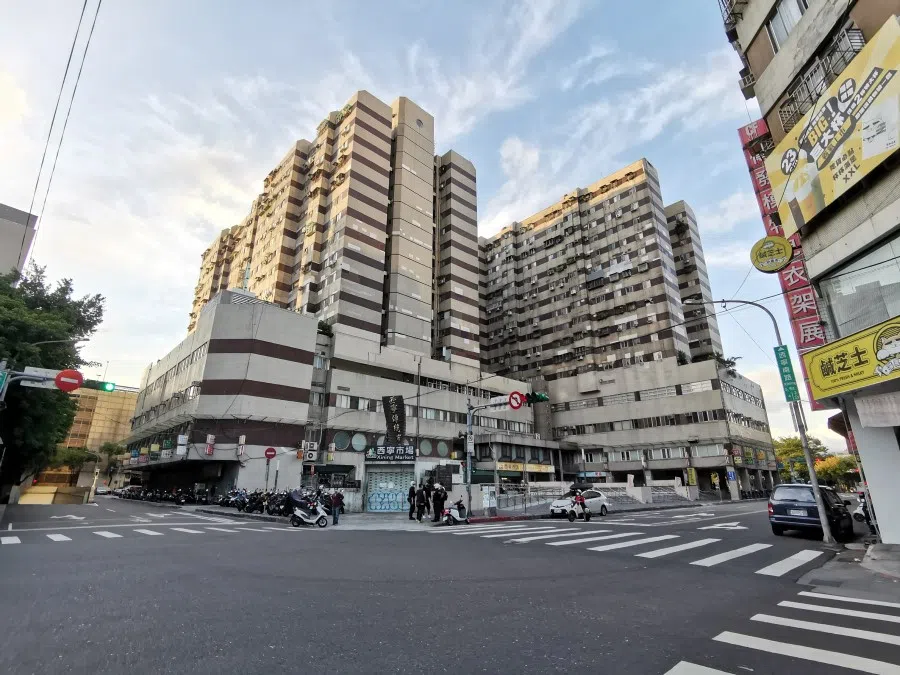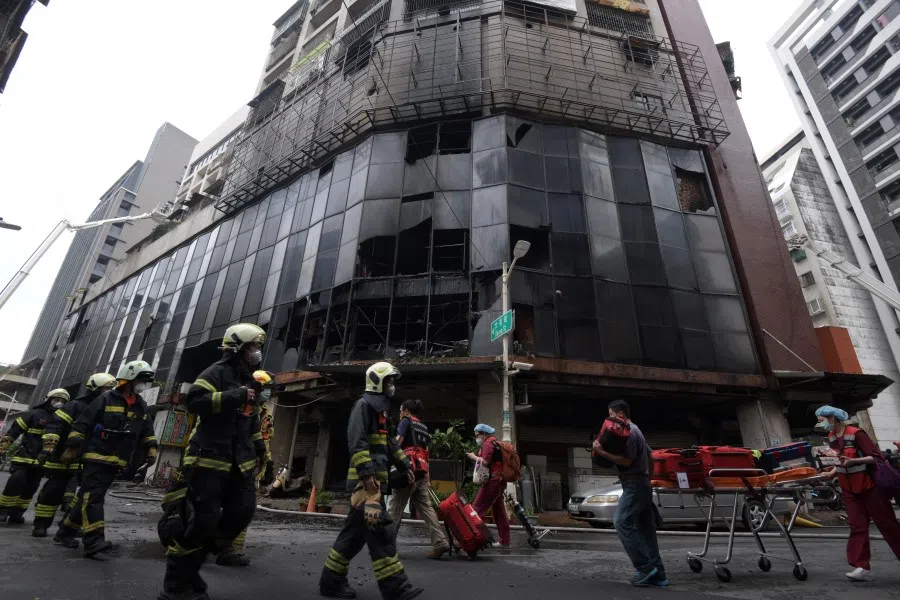Fire hazards plague Taiwan's ageing buildings and their residents, but is anyone fixing the problem?
On 14 October, an old building in Kaohsiung went up in flames, killing 46 people. That is not the only ageing building in Taiwan; hundreds of buildings are growing old along with the residents that live in them. Zaobao correspondent Woon Wei Jong visits a few of these older developments and speaks to the residents for a better idea of their living conditions and the fire hazards they face on a daily basis.

A recent fire in Kaohsiung that killed 46 people has raised the alarm about fire safety and hazards for old buildings throughout Taiwan. When this reporter visited the "slums" in Taipei's city centre, I felt the plight of residents in these tiny units, with their unending heaps of garbage and the malaise in urban management of unsuccessful negotiations to redevelop these hazardous buildings.
In the small hours of 14 October, a fire broke out in the Cheng Chung Cheng (城中城) Building in Kaohsiung, killing 46 and injuring 41, the second-worst death toll for a building fire in Taiwan's history, after the Weierkang Club fire in 1995 that killed 64 and injured 11.
The firefighting facilities at this 40-year-old residential and commercial mixed-use building were not up to code, and the 50 or so illegally parked motorcycles there were destroyed overnight, adding to the spread of the fire.
Figures show that there are over 2,000 old mixed-use buildings all over Taiwan, with 124 in Taipei alone, 14 of which are listed as old, high-risk buildings. And among 8.91 million residential buildings throughout Taiwan, 4.49 million are aged above 30 years, crossing the halfway mark for the first time last year.
'Slum' opposite Taipei 101
Following the Kaohsiung fire, this reporter found that in Taipei's busy Xinyi district, in a street opposite to Taipei 101, stands the 48-year-old Xinglong housing community, known as a "slum".
The Xinglong community is a redevelopment project dating back to the 1960s and 1970s, a low-cost public housing estate for relocated households, the low-income group, and retired military personnel. There are over 1,000 people living in 437 units, many of whom are elderly folk living alone.

Illegally parked motorcycles line the ground-floor corridor leading to the stairs; along every corridor on each level above, there are piles of flammable cardboard boxes and garbage, with the doors to some units practically buried under a mountain of trash. Turn a corner and chances are there is a potential fire hazard, including stairway lights with exposed wires, leaky and peeling ceilings, and a resident placing an umbrella in the corridor to keep out the rain.
Given the cramped living space, many residents treat the corridor as their kitchen, with gas cylinders, cooking utensils, and pots and stoves laid out.
The management committee head told Zaobao that there have been no fatal fires these few years, but admitted that anyone can access the upper floors, and there would be nothing to stop them from maliciously starting a fire.
Luo Songmei, the district head of 19 years, has also previously spoken at length to residents to get them to clear away the items at their door. "But some people just don't listen," she said. "They say 'I bought the property, so I have the right to put my stuff there.'"
...some live on welfare and a fine would only make their lives tougher without necessarily resolving the issue.
According to Taiwan's condominium building regulations, leaving items in public passages attracts a fine of NT$3,000 (about S$145) to NT$15,000. However, Taipei has only issued this fine 41 times so far this year.
The management committee head and district head said they understand that elderly residents have a small living space and would accumulate many items over a long period. Besides, some live on welfare and a fine would only make their lives tougher without necessarily resolving the issue.
When this reporter visited, two staff of the Department of Social Welfare under the city government was also visiting a "hoarder" unit, politely trying to get an elderly woman living on her own to clear away the items. The staff told this reporter: "Communication first, and if that doesn't work, public authority."
The next day, this reporter saw an elderly woman in a large bamboo hat and raincoat clearing items at her door, lifting and putting down box after box; when asked if she needed help moving them downstairs, she simply muttered to herself.

Fellow residents said her son died a few years ago, while her daughter lives on the outlying Penghu islands. The elderly woman does not want to leave Taipei, and occupies herself by collecting miscellaneous items. Residents said she is not the only elderly person living alone.
Luo Songmei said because terms could not be agreed with the developer, the Xinglong redevelopment project has not hit 60% consensus among the residents after more than 20 years, while the adjacent building - which was the same age - was torn down and redeveloped two years ago.
Zaobao found that some people were unhappy that the developer wanted them to sign the redevelopment agreement first before discussing terms, while some also intended to rent out their units for some money on the side while waiting for the right price to sell.
An informed source also said the city government holds the most land, and if it can lead the coordination, that would be the most effective. But the fact that four mayors from Chen Shui-bian to Ko Wen-je could not resolve the redevelopment issue might have something to do with the interests of conglomerates and concerns of negative political impact in the case of failure, which is why the problem has dragged on until today.
Lin Fangli, 76, and Dong Liaojing, 74, both 40-year residents, said they are used to living in this area. Their children paid for renovations and they are comfortable. But they are also worried that in the event of a fire, it will be difficult for the many elderly who live there to escape, and they called on the government to clear away the items along the corridors "once and for all, as soon as possible".
Safety nets in the building to prevent people from jumping; district head calls for fire alarms
As for Xining Public Housing, not far from Taipei Main Station, it is among Taipei's 14 high-risk old buildings. During Zaobao's visit there, this reporter saw several exposed wires along the corridors, as well as garbage and flammable items everywhere.
Xining is about 40 years old, and there have been about 30 cases of people jumping from it, earning it the reputation of being the "most haunted building in Taipei". Many who jumped were poor residents, and there have also been those who were desperate enough to go there seeking death.

District head Huang Yugen said after she took the post 15 years ago, safety nets were installed at several points around the building, and the situation has improved. But she also pointed out that the project was shoddily constructed, with sea sand (as opposed to the correct type of sand) mixed into the concrete, leading to unstable foundations and cracks in the walls - she is also worried about earthquakes. She has managed to work out redevelopment in three years, and arranged for residents to be lodged at nearby public housing.
In terms of resolving fire hazards, Huang said she arranges for volunteers to regularly clear the stairways and corridors, and has requested for the city government to provide a fire alarm for each household.
Taiwan's buildings and people are both ageing. Ironically, the fire in Kaohsiung happened on the ninth day of the ninth lunar month, known as the Chongyang Festival or Double Ninth Festival, traditionally "Elders' Day".
If one really loves Taiwan, can it start from loving the elderly, rolling up the sleeves and improving urban governance, and resolving the stubborn malaise of refuse disposal and redeveloping hazardous buildings?

Following the fire, the political figures who emphasise administrative energy and advocate slogans like "Tighten Up", "Forward!", and "Love Taiwan" quickly made public apologies complete with contrite bows, called on people to donate money, and shouted for investigations and amendments to the constitution. But how could dangerous buildings in the heart of the city be allowed to decay and accumulate garbage for 20 years, with no solution?
How could guardians of the people gamble with the people's lives? If one really loves Taiwan, can it start from loving the elderly, rolling up the sleeves and improving urban governance, and resolving the stubborn malaise of refuse disposal and redeveloping hazardous buildings?
Related: A 120-year-old Singapore monastery is getting a makeover from mainland China and Taiwan experts | Architects Mok Wei Wei and Chang Yung Ho: Imagining and building a humane city | If they don't care about it, tear it down | History, collective memory and the beauty of Taiwan's old train stations | What's stopping Hong Kong from fixing its housing crisis? | Can Hong Kong get rid of its atrocious subdivided flats anytime soon? | China's rural elderly: The disappearing keepers of tradition


![[Big read] When the Arctic opens, what happens to Singapore?](https://cassette.sphdigital.com.sg/image/thinkchina/da65edebca34645c711c55e83e9877109b3c53847ebb1305573974651df1d13a)


![[Video] George Yeo: America’s deep pain — and why China won’t colonise](https://cassette.sphdigital.com.sg/image/thinkchina/15083e45d96c12390bdea6af2daf19fd9fcd875aa44a0f92796f34e3dad561cc)